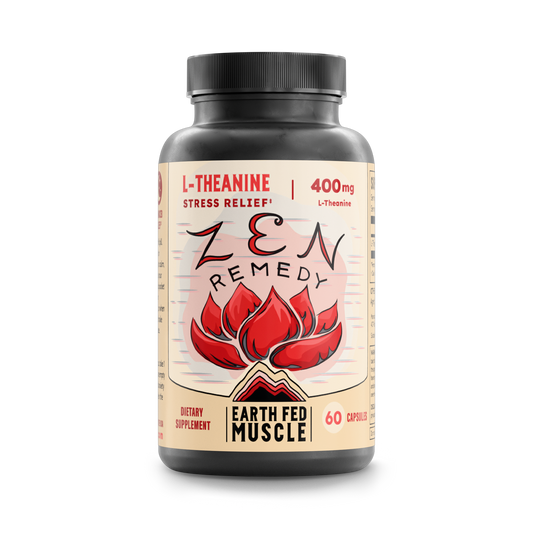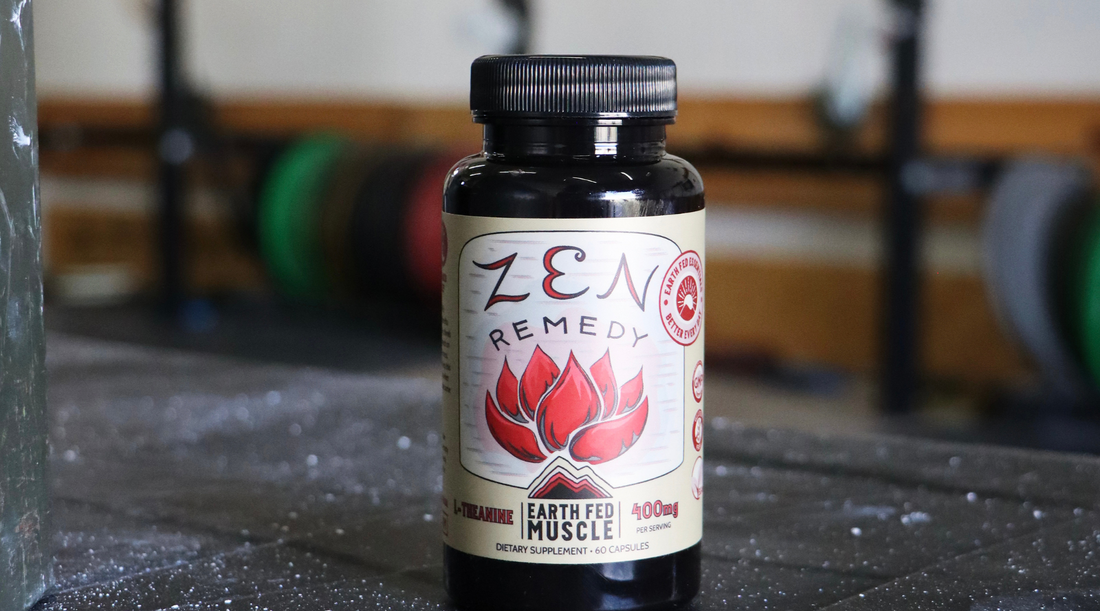The holidays are supposed to be a restful time, but more often than not, we come out of them feeling exhausted and drained. Some of us might even begin to experience serious symptoms from too much time around the family: a racing heartbeat, upset stomach and general feelings of unease. These are just a few of the common symptoms of anxiety, a psychological and physiological state that can be caused by a number of forces, both internal and external. This is where the popular amino acid L-theanine comes in, acting as your brain’s sidekick in the fight against anxiety. Commonly found in tea leaves, L-theanine helps decrease anxiety by attacking the problem at the root. EFM has L-theanine available as Zen Remedy to help you chill.
Anxiety is a complex condition that can show itself in multiple ways throughout the body. In the brain, most science suggests that the root causes of anxiety involve the connections between multiple important regions. The particular regions of interest here are those involved in your feeling of “self,” and forward-looking planning, as well as the regions that manage emotions and fear. Normally, there is a balance between these areas, where the planning regions are able to keep the emotional regions under control (1). However, sometimes this balance is thrown completely off. Whether because of fatigue, anticipation, or some more chronic change in regulation, the emotional centers of the brain take control, leading to the psychological and physiological symptoms of anxiety (2).

This is where L-Theanine comes into play. L-Theanine has been shown to increase levels of GABA, the primary inhibitory neurotransmitter in the brain (3). GABA generally works to decrease the activity of neurons that it is released onto, and research has shown a very important role for GABA in the regulation of anxiety states, particularly in the regions of the brain that manage emotions and fear (4). Beyond changes in neurotransmitters, much research on L-Theanine supplementation in humans has shown genuinely positive changes in measures of stress and anxiety. A paper published in 2007 found that individuals who were given a mental math test as a stressor experienced a decreased stress response when participants took 200mg of L-Theanine before the test. In this study, participants’ stress response was measured using heart rate variability and a standard marker of the body’s inflammatory response (5), both of which were lower in the group that received L-Theanine than in the group receiving no supplements.
Zen Remedy
$29.99

Further, a study in the journal Nutrients found positive effects of L-Theanine for participants who were asked to complete a stressful multitasking test. The participants who received L-Theanine reported lower subjective stress levels following the test, as well as lower levels of cortisol, which is a primary marker of your body’s stress response (6). Some preliminary research has also begun to show that long-term supplementation of L-Theanine can have benefits as well. Animal studies have shown that regular supplementation of L-Theanine can increase markers of brain plasticity in critical brain regions, as well as possibly promote antidepressant effects (7). Research in humans is still mounting, but the evidence is overwhelmingly positive so far. L-Theanine is a powerful tool when you need to take your brain down a notch!
It shouldn’t go unstated that anxiety can be much more serious than simply feeling unsettled from time to time. The American Psychiatric Association recognizes multiple different types of serious anxiety disorders, and these may require treatment beyond the scope of supplements like L-Theanine(8). However, L-Theanine has been clearly shown to positively impact your body’s ability to manage more mild anxiety. Through helping your brain rebalance the regulation of the regions governing fear and emotion, L-Theanine is a safe, non-habit forming supplement that can take the edge off when you need it.
Works Cited
- Stevens, Francis L., et al. “Anterior Cingulate Cortex: Unique Role in Cognition and Emotion.” The Journal of Neuropsychiatry and Clinical Neurosciences, vol. 23, no. 2, Jan. 2011, pp. 121–125, 10.1176/jnp.23.2.jnp121.
- Wang, Mei, et al. “Dysfunction of Resting-State Functional Connectivity of Amygdala Subregions in Drug-Naïve Patients with Generalized Anxiety Disorder.” Frontiers in Psychiatry, vol. 12, 13 Oct. 2021, 10.3389/fpsyt.2021.758978. Accessed 23 Nov. 2021.
- KIMURA, RYOHEI, and TOSHIRO MURATA. “Influence of Alkylamides of Glutamic Acid and Related Compounds on the Central Nervous System. I. Central Depressant Effect of Theanine.” CHEMICAL & PHARMACEUTICAL BULLETIN, vol. 19, no. 6, 1971, pp. 1257–1261, 10.1248/cpb.19.1257. Accessed 28 July 2020.
- Gauthier, Isabelle, and Philippe Nuss. “Anxiety Disorders and GABA Neurotransmission: A Disturbance of Modulation.” Neuropsychiatric Disease and Treatment, vol. 11, Jan. 2015, p. 165, www.ncbi.nlm.nih.gov/pmc/articles/PMC4303399/, 10.2147/ndt.s58841.
- Kimura, Kenta, et al. “L-Theanine Reduces Psychological and Physiological Stress Responses.” Biological Psychology, vol. 74, no. 1, Jan. 2007, pp. 39–45, 10.1016/j.biopsycho.2006.06.006. Accessed 8 Nov. 2019.
- White, David, et al. “Anti-Stress, Behavioural and Magnetoencephalography Effects of an L-Theanine-Based Nutrient Drink: A Randomised, Double-Blind, Placebo-Controlled, Crossover Trial.” Nutrients, vol. 8, no. 1, 19 Jan. 2016, p. 53, cdn.shopify.com/s/files/1/3004/6908/t/2/assets/Sonic-Clinical-Trial-Nutrients-Reprint.pdf, 10.3390/nu8010053. Accessed 30 Oct. 2019.
- Wakabayashi, Chisato, et al. “Behavioral and Molecular Evidence for Psychotropic Effects in L-Theanine.” Psychopharmacology, vol. 219, no. 4, 23 Aug. 2011, pp. 1099–1109, 10.1007/s00213-011-2440-z. Accessed 23 July 2021.
- Raymond, James G., et al. “Modeling Trait Anxiety: From Computational Processes to Personality.” Frontiers in Psychiatry, vol. 8, 23 Jan. 2017, 10.3389/fpsyt.2017.00001. Accessed 23 Dec. 2021.
